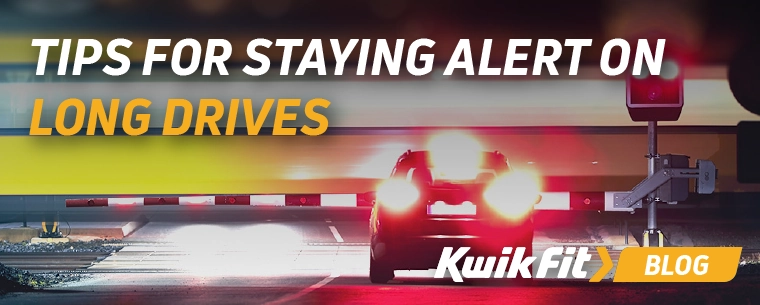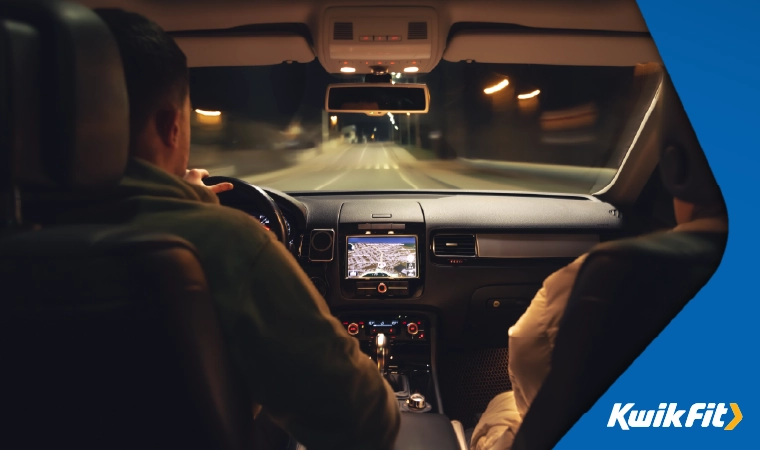Tips for Staying Alert on Long Drives
Jack Dreyer | Monday 14th October 2024 12:00pm

Undertaking a long drive can be challenging, even for the most seasoned drivers. Whether youíre travelling for a holiday, work event, or to visit family or friends, itís important to prepare in advance to ensure your drive is as safe as possible.
One particular issue that many drivers face on long drives is tiredness. While it may not seem like driving requires a lot of energy, sitting behind a wheel for long periods of time requires a high level of concentration and focus that can be very energy draining. Itís estimated that fatigue accounts for between 10 and 20% of all road accidents in the UK. Thatís why weíve compiled a list of top tips to help you stay fresh and alert on a long drive.
1. Schedule regular breaks
Before setting off, look at your map or satnav and decide on the route you intend to take. We also recommend researching the service stations along the route so you can plan which ones you want to stop at. You may need to get out of the car for a few minutes and stretch, or take a nap for an hour or two if youíre feeling a bit tired. Regardless of the reason, scheduling regular breaks for long drives is crucial for maintaining your health and safety.
2. Get a good night's sleep
Trying to drive a vehicle when youíre tired or havenít slept well the night before is unsafe and can potentially be fatal. We canít stress enough how important it is to get a good nightís sleep before setting off on a long drive.
If you struggle to fall or stay asleep, here are our tips for you to implement into your sleep routine:
- Avoid screens that emit blue light, ideally a couple of hours before your bedtime. This includes computers and laptops, mobile phones, and tablets.
- Avoid drinking caffeine in the evening.
- Go to bed at a set time every evening.
- Do a relaxing activity before bed, for example read a book, practice meditation, or take a bath.
3. Drink plenty of fluids
Drinking plenty of fluids before and during a long drive can help you to stay alert and avoid drowsiness. Ideally, this should be 6-8 glasses of water, however, the Eatwell Guide also states lower-fat milk and sugar-free drinks count towards your fluid intake. Caffeine can be consumed in moderation, but some people are more sensitive to the effects of caffeine than others so bear this in mind before undertaking a long drive.
4. Eat nutritious food
Itís not recommended to eat a large meal or heavy snack before a long drive, however, eating foods that are nutrient dense can help improve concentration and energy levels. Try opting for light snacks that contain protein, healthy fats, and vitamins, such as fruits (oranges, blueberries, and strawberries) and nuts (almonds).
5. Listen to music or a podcast
A good strategy for staying alert and reducing drowsiness is to listen to background noise. Maybe you have a favourite album or podcast that you enjoy listening to? Whatever it is, make sure to have something playing in the background to keep your mind active and stimulated. Music is also proven to reduce stress and anxiety levels, which is great if youíre a nervous driver.
Itís important to note that loud noises and music can be distracting, so be mindful when setting the music volume.
6. Alternate driving with a friend or family member
Having to drive a long distance by yourself can be lonely and tiring so, where possible, we will always recommend travelling with at least one other companion, either a friend or family member. This means if you start to get tired or drowsy, someone else can take over for a period of time while you get some much needed rest, and if they start to feel tired you can then take over from them, and so on.
Youíll also have the added benefit of company and conversation to keep everyone's morale high, which is always a plus when undertaking a long drive.
7. Avoid driving at night
Finally, our last tip for staying alert during long drives would be to avoid driving at night. While it may seem convenient to drive at nighttime when the roads are quiet and less busy, it can be very dangerous if youíre feeling tired or drowsy. Did you know that there are roughly 40% more fatal accidents on the road at night? Other factors like poor weather conditions can reduce visibility and make driving in the dark very challenging.
If you intend to drive for a long period of time, we recommend doing so in the light and after a good nightís sleep.
Ensure your vehicle is ready for long drives

There you have it - our top tips for staying alert on long drives, whether for business or staycation trips. As long as you stay well-rested, hydrated, and take plenty of breaks, you should be good to go. One thing we donít recommend is driving for more than 8 hours in one day, so if you know your drive is going to surpass 8 hours itís probably best to find an overnight stay at a service station or hotel.
And, of course, donít forget to make sure your vehicle is ready to undertake a long drive. Whether you need your tyres checked or your car serviced, our friendly team will be happy to help. Get in touch with us or pop by your local Kwik Fit centre.
You can also find out the latest motoring news and trends by keeping up-to-date with our blog.
Any facts, figures and prices shown in our blog articles are correct at time of publication.
Featured Articles
Is it Illegal to Drive With One Headlight?
Saturday 19th July 2025
Wondering if itís illegal to drive with one headlight? Learn about the safety risks and penalties of illegal blown bulbs and why you should fix them promptly.
Air Con in EVs & Hybrids: Experts Answer Your Questions
Monday 30th June 2025
Does air con drain EV batteries? Can you use the air con while charging an electric car? Find out the answers to these questions & more from Kwik Fitís experts.
Why Is Your Car Making a Noise? Fixes & Tips
Friday 13th June 2025
When your car starts making unexpected noises, it can certainly be quite disconcerting; it may be nothing to worry about, but hereís what you need to know.









